
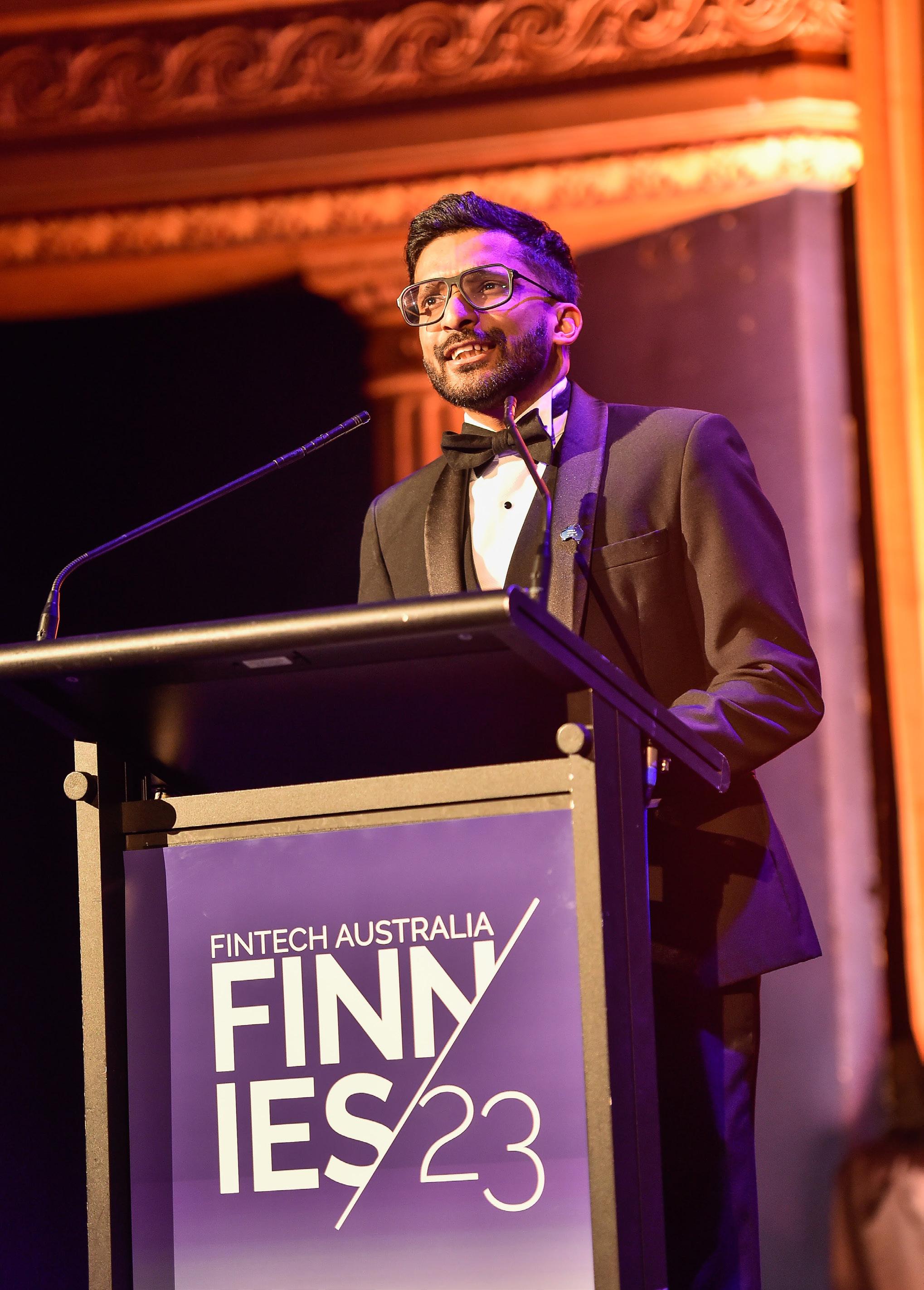





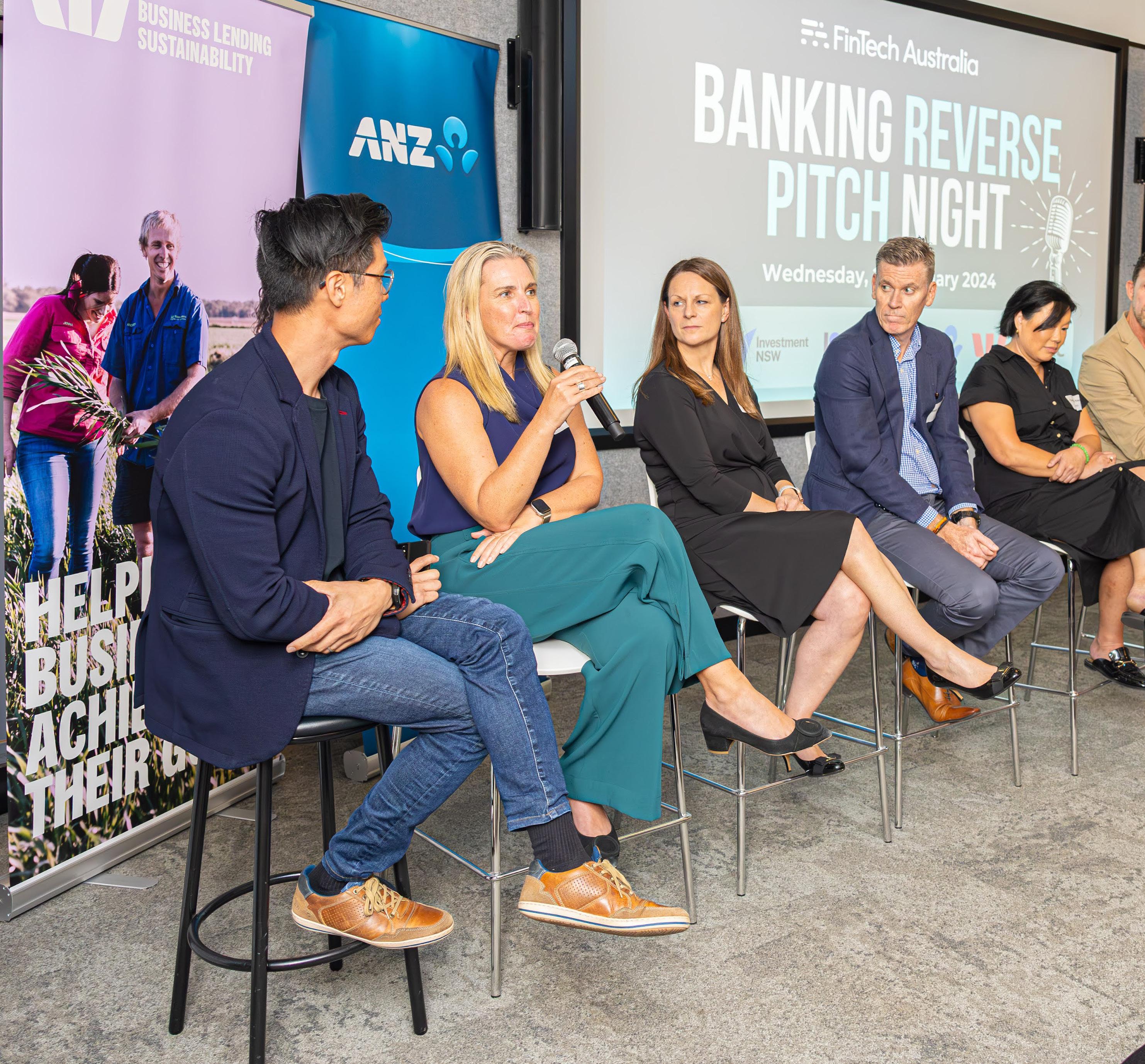
Here to grow and support the creation, development, and adoption of financial technology across the Australian economy and beyond, we dive into how FinTech Australia has become an unparalleled leader in the everexpanding technology industryWriter: Lauren Kania | Project Manager: Alfie Wilson
Financial technology (FinTech) has significantly influenced myriad industries for decades.
In every sector across the world, technology, particularly the widespread use of devices like smartphones and tablets, has altered the way the financial market interacts with the public, its customers, and even its own internal processes. Admittedly, it can seem quite overwhelming to manage at times, which is where FinTech Australia comes in.
Having proven itself to be a leader in FinTech innovation, the company works to engage and collaborate with the government, businesses, and the broader community to support the ongoing creation,
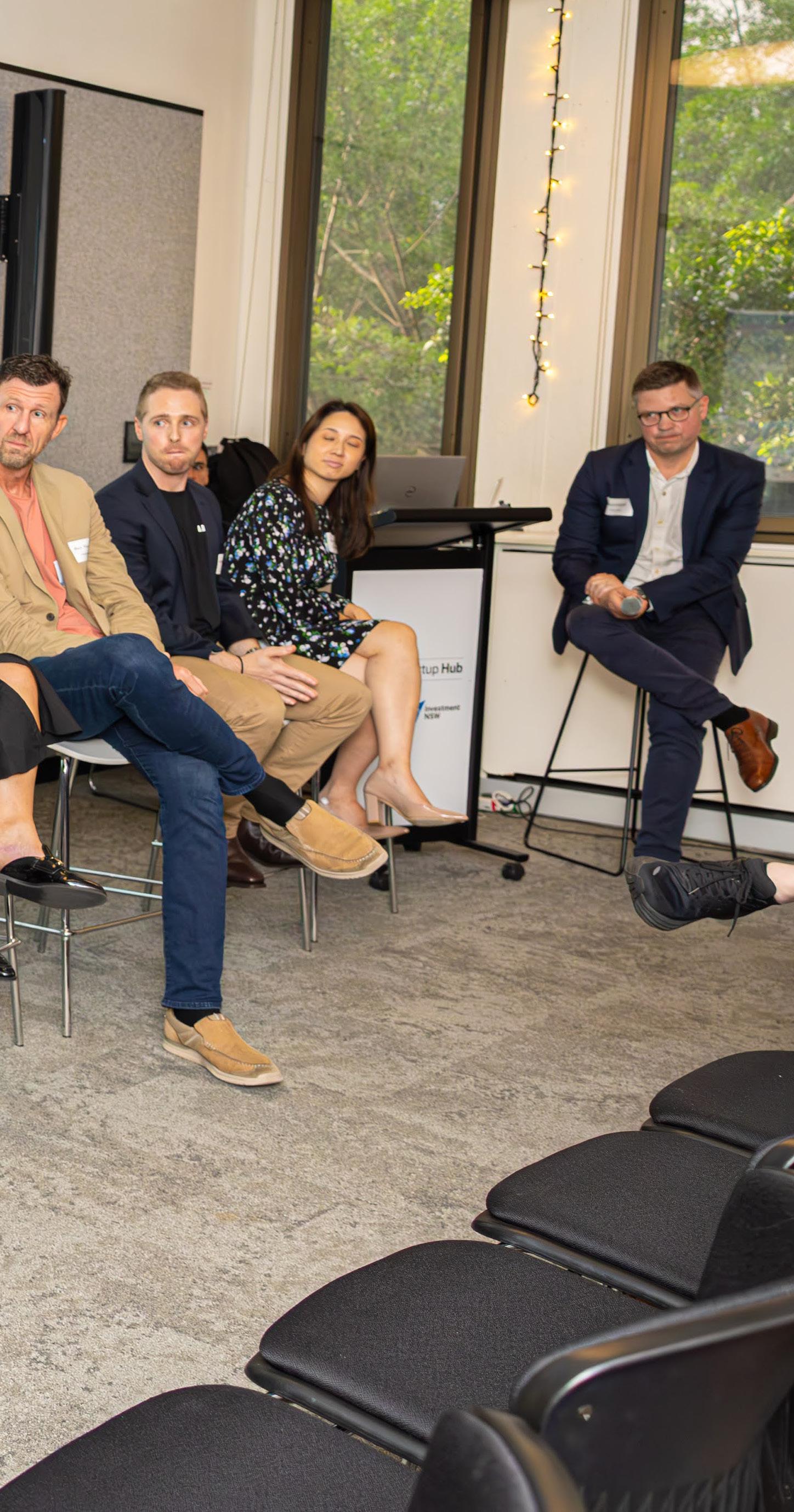
development, and adoption of the technology across many diverse industries.
With a vast range of membership options, joining FinTech Australia helps to grow the industry and provide companies with a seat at the table. The community has seen significant expansion, now comprising a diverse network of over 400 members and numerous corporate partners.
Punching well above its weight in the global FinTech arena, Australia’s ‘can do’ attitude, combined with a supportive regulatory environment, means that the country is well placed to take advantage of the financial and technological revolution.
ENGAGEMENT – Connecting the FinTech ecosystem to support its growth for the benefit of the Australian economy and society.
ADVOCATE – Promoting the industry in public forums and with policymakers to highlight the benefits of FinTech adoption and amplify the voice of all its participants.
EMPOWER – Strengthening and uplifting the Australian FinTech ecosystem while promoting its capacity for positive change locally and globally.
By offering options such as contactless payments, money management, and blockchain and regulation services, FinTech Australia opens up a world of opportunity and choice for the nation’s retail consumers and businesses alike. The company has made such an impact that it has appeared in over 500 separate media articles within a single year, representing the views of the industry both nationally and overseas.
As financial services is Australia’s largest industry, the country possesses one of the world’s strongest and most dynamic FinTech marketplaces. However, FinTech Australia is keen to explore new opportunities to further grow into international markets, including the formation of partnerships with overseas companies to provide a diverse range of product offerings for businesses and retail consumers across every nation.
The company has gone so far as to expand its international outreach programme, hosting events in Taiwan, Singapore, India, Amsterdam, the UK, and the US, further showcasing its dedication to helping pave the way for the international expansion of members.
There are a variety of benefits to implementing FinTech in any business, such as increasing speed and convenience, providing great choice for consumers, finding the most economical deals, and offering products or services that are personalised to the individual, among many other additives.
As the peak advocacy body for the FinTech sector in Australia and led by professionals passionate about finding new ways to deliver services that ultimately benefit customers, FinTech Australia is leading the way and growing this world-changing industry to new levels both inside and outside the country.

Rehan D’Almeida, CEO of FinTech Australia, speaks to us about the company’s trailblazing history and its exciting future of connecting, challenging, and advocating for one of the fastest growing technology sectors in the world
With over 800 companies based in every state and territory capital, Australia has one of the world’s most exciting and evolving FinTech sectors, as shown by its growth from an AUD$250 million industry in 2015 to an AUD$45 billion industry in 2023.
Situated on the doorstep of Asia, which is increasingly becoming the economic centre of the world, Australia is a prime location for companies looking to establish their regional headquarters.
This evolving intersection of financial services and advanced technology has been spearheaded by the dedicated workforce of FinTech Australia who, despite its recent inception, has proven to be at the forefront of the industry’s future.
As Australia’s second highest-funded sector, raising more than AUD$6 billion since 2020, FinTech Australia is committed to supporting and propelling the industry through its next stages of growth.
Rehan D’Almeida, CEO of FinTech Australia, delves into the exciting challenges that the sector currently faces and the ways in which the company is primed and ready to continue its exponential growth well into the future.
APAC Outlook (AO): Firstly, could you talk us through the origins of FinTech Australia and its founding mission?
Rehan D’Almeida, CEO (RD): Back in 2015, FinTech Australia’s founding members were looking at the international FinTech space and the opportunities that were opening up. Coming together, they began talking about the latest innovations and ways Australia could support this newly growing ecosystem.
Globally, there were conversations around FinTech, but Australia as a country was still in its early days of this technology.
Subsequently, approximately 50 founders came together to ensure that there was a united voice that would represent the entire sector rather than individual members, and a place where competitors and new innovators alike could converge to showcase and discuss the opportunity that is FinTech.
This proposal was then taken to the government, and Treasurer, Scott Morrison was approached to discuss the opportunities that FinTech could provide to the industry and how it needed governmental support.
In fact, we were fortunate that Morrison was really supportive of the industry and added FinTech to the upcoming agenda, to the point where we had a dedicated minister specifically for FinTech innovation.
It then became crucial for us to acquire government support and regulators to highlight how there was a growing, extremely innovative space that needed a united voice to represent industry.
We ultimately became this voice, but that required the backing of all the relevant stakeholders to ensure Australia was innovative enough to support this new ecosystem and that companies were building interesting and unique solutions.
AO: What is your current take on FinTech in Australia? Is it a particularly exciting or challenging environment to work in?
RD: It’s both exciting and challenging, which makes it really interesting and keeps everyone motivated to continually support the industry.
In terms of the current FinTech space, it has definitely evolved significantly from its early days. Start-ups in general are going through a phase of funding challenges and getting access to the necessary capital, which has probably been the most difficult aspect for the industry since its early days.
Economic challenges are being impacted from multiple areas; it’s not just the limited venture capital (VC) – it’s the early-stage investments, the government grants, and much more. Thus, everything is drying up, making it a lot more
challenging for start-up companies to adapt to this new environment where they have to manage their capital much more efficiently, prioritise some of their core business areas, and ensure that they can continue to support the industry and provide their services without too much of a cash burn.
However, we’re seeing incredible ways in which businesses are adapting to this new environment, managing their funding, and finding the ability to sustain their growth as the capital environment improves.
Globally, everyone’s going through the same challenges. However, the ecosystem is supportive of how it can help navigate the industry to get through to the other side.
AO: What makes Australia’s FinTech landscape unique and a prime location for companies and innovators looking to expand their opportunities?
RD: There are two main points that allow Australia to differentiate itself from the rest. The first, and most important, is the acceptance of digital technologies and their uptake in the country, which is incredibly high.
We’re probably one of the biggest consumers of tapto-pay, near field communication (NFC) payments such as Apple Pay and Google Pay, with almost everyone in Australia having access to these new technologies using smartphones and digital bank accounts.
However, this is a small market in comparison with other larger regions in the world, as Australia has a significantly smaller population.
Therefore, the opportunity for FinTech companies is specifically around being able to provide these newer technologies and innovations within the industry.
It is a creative testing ground in a highly regulated market where the government has a keen interest in understanding and supporting the ecosystem. The industry also ensures that transactions are safe, and that scams, fraud, and cyber risks are reduced, guaranteeing the protection of consumers.


Firstly, please briefly introduce us to Monoova with an overview of your main products and services, including your NPP and API-enabled payment solutions such as PayID and PayTo.
Monoova is a leading payment service provider (PSP) in Australia. We specialise in real-time payments and payments automation for businesses. Through our APIs, companies can tailor how they receive, manage and pay funds.
We provide a range of payment types from real-time NPP (New Payments Platform) payments using PayID and PayTo, to traditional payment rails such as BPAY, online card payments and direct entry. We also provide FX services.
PayTo and PayID make payments easier, safer and more personalised is gaining traction in Australia. PayIDs remove the need for sharing BSB and bank numbers and allow people to use unique aliases instead, identifiers that people already have committed to memory such as an email or their phone number. And since transactions to PayIDs take place on the real-time rails, these payments are not only fast but also less likely to fall victims to errors and fraud.
PayTo is another emerging payment method. From the outside, PayTo works like an instant pull payment. Once the customer has agreed to a digital agreement, sent to their mobile or online banking, the merchant can automatically request payment and funds are transferred instantly. In this sense, PayTo is like a modern, real-time, direct debit. Interestingly though, it is not just for recurring billing; it is also an effective and more secure option for checkout and oneoff payments. And behind the scenes, there is considerably more
sophistication to PayTo than ‘just’ speed. At Monoova, we believe that people in a few years will struggle to remember last time they DIDN’T use PayTo when paying for something online.
Our all-in-one platform doesn’t just offer the largest variety of domestic and FX payment options. We also have a proprietary solution that automatically reconciles payments, which can reduce time spent on reconciliation up to 99%, from hours to seconds. Overall, Monoova takes the friction out of payments, solving issues for a broad array of use cases, from one-off purchases to ongoing account top-ups and recurrent billing.
Whilst we are based in Australia, our clients are global. We enable businesses internationally to access the Australian payment rails so they can offer local payment options for their Australian customers. For instance, you might be a Singapore-based remittance platform with a requirement for collections in Australia. We can help you.
Importantly, while we have a strong standing in the FinTech space, we are not limited to this sector. We service a wide range of verticals including travel, healthcare and wealth management. We can save any business that is processing high volumes of complex payments hours, even days, of manual processing and administration.
Could you outline Monoova’s core mission, values, and ethos? How are these integrated into the everyday running of the business?
Payments happen everywhere all the time. We believe they should be simple and unintrusive. A great payment experience should be remarkable only by virtue of how unremarkable it is,
so fast and smooth that you really don’t notice it. Monoova is pioneering payment journeys in Australia bringing seamless, speedy transactions and processing for our clients and their customers.
It has been five years since we launched the Monoova brand. Since our very first day, we have consistently been early to market with new payments products and solutions such as:
• one of the first live NPP Identified Institutions
• the first and only initiator of PayTo with production-level volume
• launching the first automated reconciliation platform utilising PayIDs
Our business model has always been to work alongside industry stakeholders and play to our respective strengths. Monoova enjoys long-standing partnerships with banks and industry groups beyond a typical vendor-client relationship. In fact, Monoova is often invited to exchange ideas and experiences drawing on each party’s perspective. Among others, these include the AP+’s PSP Advisory Forum and Cuscal’s Strategic Client Committee. Additionally, Monoova is working with policy makers and regulators such as the Commonwealth Treasury and the RBA to ensure a voice for FinTechs as new regulation is contemplated across payments, scams, digital-currency exchanges, privacy and more.
Our General Counsel sends regular and detailed submissions to FinTech Australia, proactively engages with Treasury on a wide range of reforms including authoring comprehensive submissions, routinely engages with industry bodies, and frequently heads law firm roundtables.
Being an active voice at every level, is not just about Monoova’s success but ensuring a future where innovation can thrive for the industry as whole, achieving better outcomes for every touch in the payment journey.
Could you outline how Monoova stands out from the competition, in terms of its offering, compared to traditional payment platforms?
Monoova is a fast, first mover in the market bringing the best solutions backed by NPP innovations. PayTo is an example of taking existing and prospective clients through education and implementation to success. Today, Monoova is responsible for a majority of all PayTo activity, 18% of all PayIDs and 1% of ALL realtime transactions in Australia.
However, it’s not just about being fast and first. At the heart of what makes Monoova different to our competitors is the versatility of our payment platform. We believe that the future is real-time, so, naturally, we have a focus on real-time payments. However, we also recognise that we need to build a bridge to that future by offering traditional rails as well (BPAY, bank transfers, direct debits, RTGS, FX and online card payments). Offering ALL rails in the Australian market makes us rather unique. But the aspect of our product that we are most proud of is our virtual-account and automated, real-time reconciliation features. Combined with our flexible payment options, this is where majority of our clients derive most of their value – value that they can’t get anywhere else in market.
And then there’s our people. By fostering an empathetic company culture and empowering our staff to make right by our clients, we provide outstanding service and support from integration through to live accounts and beyond. It is increasingly common these days for B2B customers to expect a personal level of service. We are exceptionally proud of the consistent feedback we receive from our clients who praise our teams for their support and expertise.
Could you briefly outline how the Monoova payment platform provides security, cost reduction, scalability, stability, and control for its users?
It goes without saying that security is paramount and Monoova puts security at the forefront of everything we do. For instance, even though it wasn’t standard at the time, our payment solution had 2FA built in from the start.
We are SOC 2 Type 1 compliant. SOC 2 is a security framework that specifies how organisations should protect customer data from unauthorised access, security incidents, and other vulnerabilities. Investing in the SOC 2 security framework has been an important step in continuing our commitment to provide our clients with the best security standards available platform for processing payments for example, choosing partners such as Fastly to enhance transaction security.
We are also building on the network effect we have achieved in our target verticals to combat scams by enabling our clients to share information as appropriate about patterns and typologies before they spread.
What are your key priorities, targets, and goals for the year ahead?
2024 is going to be a big year for us. We expect that we will see a considerable growth of PayTo volumes as more clients and more use cases come to market to benefit from this fast and secure payment type. PayTo will move from being excitedly talked about by insiders to reaching the mainstream.
In parallel, having launched both PayTo and, recently, our online card-acquiring product, we will be returning to our roots to release some exciting new features to our core account-to-account offering.
All of this, of course, is about growing for and with our clients. When you service leading tech companies, you need to run to keep up. And if you want to stay ahead so that you are ready when they are, you need to run faster still. We have a few big names coming online with Monoova in the next few months. It should be exciting!
www.monoova.com
 Christian Westerlind Wigstrom, CEO and co-Founder, Monoova
Christian Westerlind Wigstrom, CEO and co-Founder, Monoova

The unique solutions and innovations that are taking place in the national industry put companies that succeed in Australia in a rare position to go global and take their learnings from the domestic market across the world.
Australia and the global markets are also forgiving, enabling companies to learn and evolve so they eventually succeed in other markets if they fail at first.
This puts us in a unique position to welcome any FinTech company, as they can take advantage of the Australian market to grow scale and have access to the greater Asia Pacific region.
In addition, the free trade agreements between Australia and the UK, as well as other trade agreements with areas such as Singapore, help companies with their growth plans and trajectory.
There’s also lot of support from state and federal governments, as well as Allstate Investment, Global Victoria, and Trade and Investment Queensland (TIQ), who are really supportive of businesses looking to expand nationally and internationally.
AO: How is the organisation supporting the ongoing creation, development, and adoption of FinTech across diverse industries?
RD: Right now, our key focus area is specifically around policy advocacy. This includes talking to the government and regulators to help them understand which direction innovation is going in, what the new opportunities are, and which companies are creating these solutions.
What supports our goal and initiative is the added benefit of being the key, credible voice in the industry that a range of stakeholders want to listen to.
We have the opportunity to raise more awareness around the general community and discuss how FinTech is evolving, changing, developing, and in what ways this new sector can protect consumers, create jobs, and increase innovation.
Therefore, our key area is to be an advocate for the industry, the government, and other key stakeholders, and be a vital aid to general consumers and representative bodies in ensuring that everyone understands the value that FinTech has to offer.
AO: With the company’s eighth anniversary coming up, how has FinTech Australia seen the industry evolve, and how do you see the sector developing over the coming years?
RD: It’s really wonderful to look at the industry in retrospect and see how things have evolved and changed over the years.
I remember the early days of FinTech Australia when we were talking about the specific challenges around comprehensive credit reporting and crowdfunding, thinking about how a general consumer or a retail investor could invest in early-stage start-ups through the crowdfunding regime.
These were all initial conversations on what innovations FinTech could provide and the unique solutions that were
“THE UNIQUE SOLUTIONS AND INNOVATIONS THAT ARE TAKING PLACE IN THE NATIONAL INDUSTRY PUT COMPANIES THAT SUCCEED IN AUSTRALIA IN A RARE POSITION TO GO GLOBAL AND TAKE THEIR LEARNINGS FROM THE DOMESTIC MARKET ACROSS THE WORLD”
– REHAN D’ALMEIDA, CEO, FINTECH AUSTRALIA
arising in the industry to challenge traditional financial institutes and banks.
One of the key aspects, both in Australia as well as globally, is the level of acceptance from the financial institutes and banks of FinTech companies. The sector is no longer seen as a competitor, but more as a collaborator and a partner in the industry.
We think there are significant opportunities for these FinTech companies to build solutions that help banks and traditional financial institutes succeed. This would create a win-win situation rather than the competitive environment that we saw in the early days.
We have taken advantage of this newfound partnership and support of the ecosystem by creating opportunities for banks to create pathways for FinTech start-ups to work with them and find gaps in the industry that they can solve.
It’s been interesting to see recent changes in the industry, such as the consumer data rack, which is Australia’s version of the Open Banking regime – a global trend and phenomenon. This is exciting because it offers a lot of unique opportunities within the FinTech space, such as payments reform. Australia is currently going through an entire exercise of reforming the payments ecosystem

and regulating the players involved based on a tiered licensing framework.
The regulation of digital assets, cryptocurrencies, and other digital assets was barely spoken about back in the early days of FinTech, but now it’s all coming together.
That’s where the uniqueness and beauty of this industry continues to evolve into new conversations around artificial intelligence (AI) and how it is impacting the industry. Ultimately, there’s so much that is happening to help develop the industry and keep founders and entrepreneurs on their toes.
AO: Can you outline your strategy map and what it entails for the collective interests of the Australian FinTech industry?
RD: This is an exciting topic because we recently had our strategy day, where we discussed the upcoming opportunities for the industry and how these will impact its ecosystem.
I would divide this into six key pillars that we’re really looking into to support the FinTech sector.
The first pillar is around disruption and innovation, i.e., understanding the disruptive technologies in the industry and the unique innovation that is taking place.
The second pillar is the adoption and creation of new technologies that can enable this level of disruptive innovation.
The third pillar concerns the improved and increased funding environment, which ensures that there are opportunities for unique technology companies to access funding and also create more awareness for global investors to see the amazing opportunities that present themselves in Australia.
The fourth pillar is around industry and community growth. This is extremely important because as you increase awareness of the ecosystem, it grows even further to facilitate support for the community.
“WE HAVE THE OPPORTUNITY TO RAISE MORE AWARENESS AROUND THE GENERAL COMMUNITY AND DISCUSS HOW FINTECH IS EVOLVING, CHANGING, DEVELOPING, AND IN WHAT WAYS THIS NEW SECTOR CAN PROTECT CONSUMERS, CREATE JOBS, AND INCREASE INNOVATION”
– REHAN D’ALMEIDA, CEO, FINTECH AUSTRALIA
The fifth pillar regards gross regulation and government. This includes working closely with the government and regulators to help them understand the constantly evolving nature of the industry and how it needs their support.
The final pillar is about the social and environmental impact of FinTech. This involves seeing what impact the industry is creating and how we can educate and share these learnings to ensure people understand its effects both socially and environmentally, which then enables them to support the ecosystem.
AO: How do you play a strategic role in promoting FinTech’s environmental and socioeconomic progress?
RD: There are some key initiatives that we’ve been looking into to support the system in this regard. One is the idea that nothing happens without the right research and understanding of the ecosystem. Therefore, we undertook a comprehensive census that was launched almost eight years ago in partnership with Ernst & Young (EY).
This census is conducted every year in an attempt to understand the challenges of the ecosystem and its socioeconomic impact, ranging from diversity to target customers, to how companies are growing and supporting the industry and prioritising environmental, social, and governance (ESG) practices.
We then take those learnings to create the best initiatives and find the right partnerships to support the ecosystem.
More recently, we partnered with the key ESG Chief Index, CliMA, to understand our own socioeconomic and environmental impact on the industry. Through assessing these findings and becoming self-aware, we are able to share those learnings and knowledge with the industry, which is a key area of our continuing support.
It’s all about learning from our members and the unique solutions that they are building to help their own socioeconomic and environmental impact, solve some of
those challenges, and build awareness.
Just recently, we launched a new initiative called FinTech for Net Zero, which is an opportunity for FinTech companies within the ESG space to discuss the solutions they’re building to solve this critical topic.
It’s all about these key initiatives that we can expand upon and the awareness that we can create around the impact of the industry and what can be done in the future.
Significant regulatory mandates will also be put in place in the coming years that will enable the sector to offer the adequate space to thrive and provide new opportunities and innovations to help within the environmental and socioeconomic space, which we are really supportive of.
AO: What are some of the key initiatives for FinTech Australia?
RD: We run key initiatives every year to ensure the success of the industry.
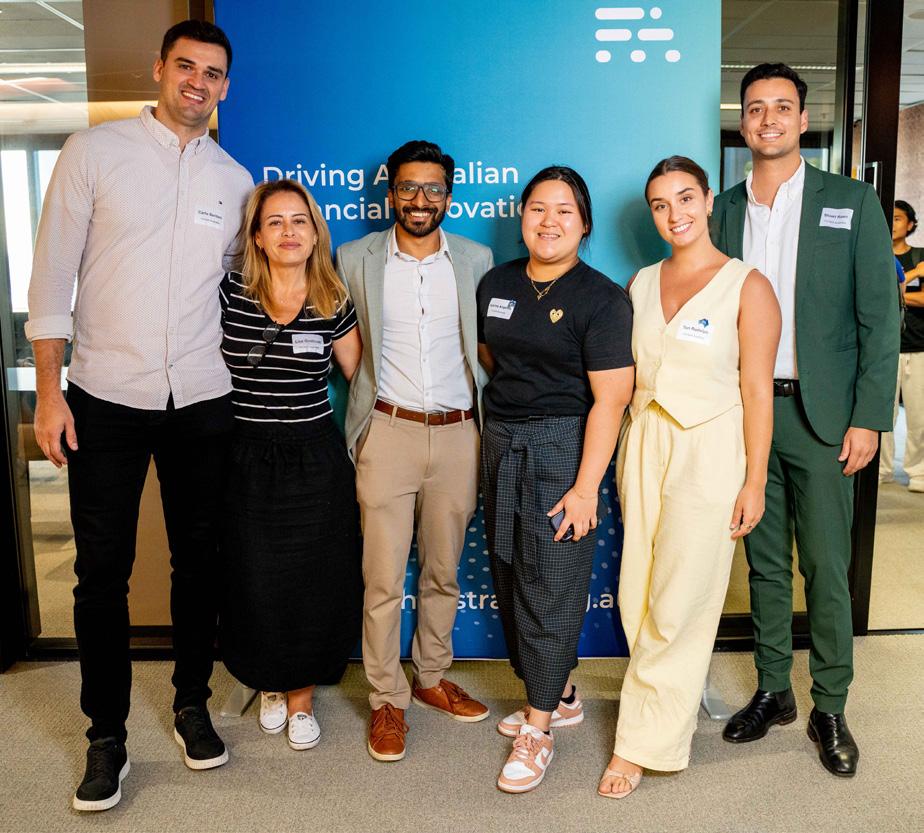
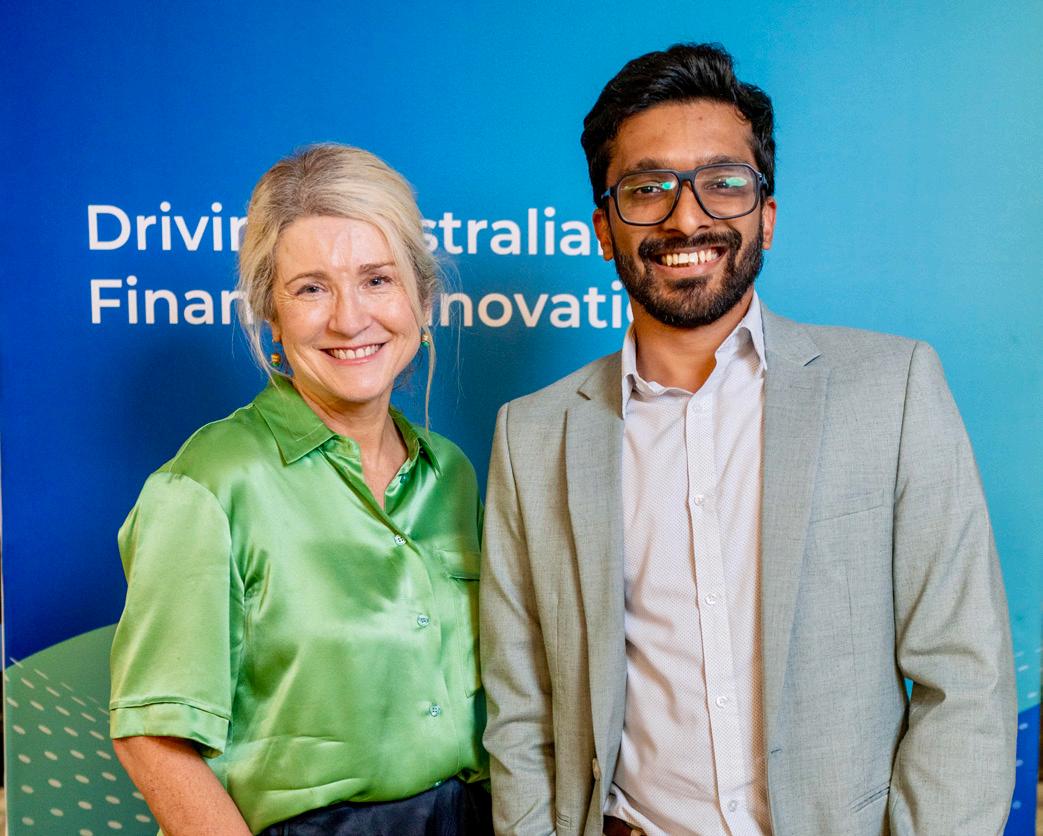
To start with, our biggest conference is the Intersect FinTech Conference. This is when we get stakeholders into one space, along with international companies, local companies, FinTechs, banks, financial institutes, regulators, and the government, to talk about the specific challenges in the industry, the regulation that’s happening, the current consultations, and the learnings from the perspective of the government and the Reserve Bank.
Everyone gets to share their voice and has the opportunity to enable collaboration, learning, and knowledge sharing.
This is really important for us and complements all the work we do throughout the year, including our policy and advocacy efforts and our key learnings, amongst more. We bring the topics to this conference and share the information to ultimately learn more and have those renewed conversations throughout the rest of the year.
Another key initiative that we launched in 2024 that has been hugely successful, and we will continue to work on, is the reverse banking pitch, which lets banks share their problem statements with FinTech companies. This has proven to be hugely prosperous and has now acquired a global audience.
Two final initiatives include the CDR Summit that we’re launching, which concerns consumer data rights and enables companies to talk about the opportunities and challenges on the topic.
Lastly, the Finnie Awards discusses the success of the industry and showcases key innovators in the FinTech space, as well as highlighting the unique solutions that are being created and celebrating those wins by giving recognition to the inspiring companies.
AO: Finally, what are the goals and priorities of FinTech Australia, and what strategies will you employ to facilitate and implement them?
RD: Our first priority is to continue to advocate and be a voice for the industry and showcase the amazing things
that it can create.
Our members range from extremely large, globally recognised companies through to small businesses, comprising a team that is building the next unique, innovative solutions for the industry.
We want to be the voice for people who don’t have the time or effort to do so, because as that person grows and scales their business, it reaches a point where they will need to influence policy or regulatory changes.
Therefore, through an advocatory approach, we want to represent those voices and talk to the government about new, unique solutions and innovations that are taking place, and ensure they also enable innovation to occur while protecting and keeping consumers safe.
That’s going to continue to remain a priority for us, but some of the key areas that we see as both an opportunity and a huge challenge in the industry are how we can also represent and be a voice for companies around investments and capital raising, while recognising the new challenges around ESG awareness.
Within the investment and capital raising space, we ask ourselves how we can grow to showcase what FinTech has to offer and also put companies in touch with other organisations that they may want to invest in.
On that same note, it’s also about incentivising companies to create unique solutions. We want to continue to support this so that businesses have access to state grants, financial aid, and any other opportunities.
When it comes to ESG, the new key initiatives that we’re trying to launch are about promoting the FinTech ecosystem and enabling more companies to find unique solutions within the space.
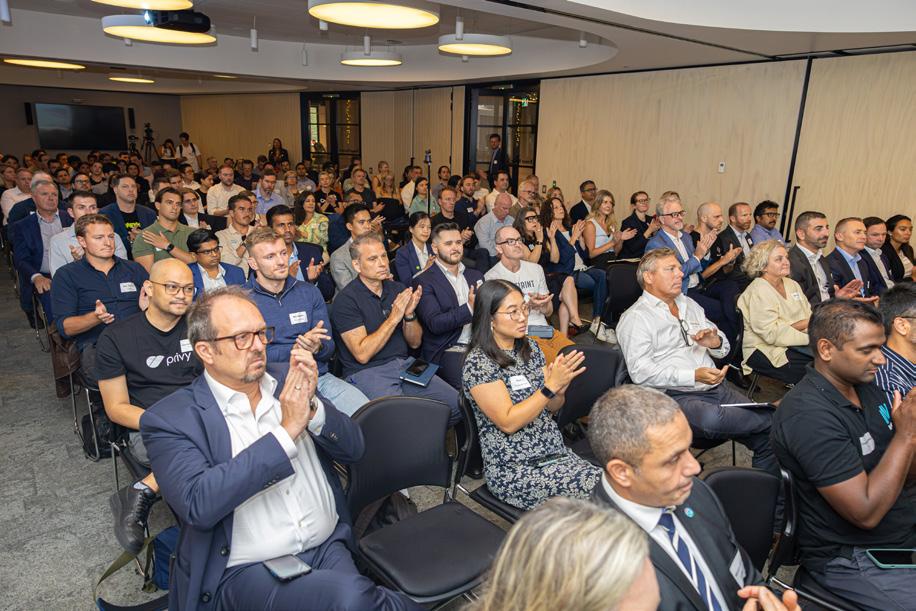
www.fintechaustralia.org.au

Sydney Stone & Chalk Level 5, 11 York St, Sydney NSW 2000
Melbourne Stone & Chalk, 121 King Street, Melbourne VIC 3000
www.fintechaustralia.org.au